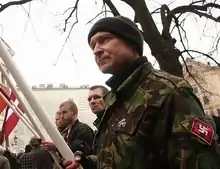Igors Šiškins
Igors Šiškins (born 9 June 1959 in Rēzekne) is a Latvian ultra-nationalist and the director of the "Gustavs Celmiņš Centre". During the 1990s Šiškins was a member of the Latvian ultra-nationalist movement Pērkonkrusts. He was one of those convicted for bombing the Victory Memorial to Soviet Army in June 1997.

Biography
Šiškins was born in Rēzekne to a Russian father and Latvian mother, but calls himself Latvian because his parents separated when he was young.[1] In 1975 he graduated from the Professional Builders Technical High School No. 19.[2] During the Soviet era Šiškins worked as a driver, locksmith, and stonecutter.[1]
In the early 1990s Šiškins was involved in the ultra-nationalist Pērkonkrusts movement, which attempted to follow the principles of the pre-World War II movement. Šiškins was linked to the bombing of the Victory Memorial to Soviet Army on 5–6 June 1997. The following year Šiškins sent a letter to the newspaper Diena saying that "as a member of the Latvian people, only opposition to the Latvian regime and ethnic nationalism is acceptable...The will of the people is the will of God."[3]
In January 1998 the Latvian Constitutional Protection Bureau began a search for Šiškins and other members of Pērkonkrusts, and Šiškins was arrested in April of that year.[4] In 2000 he was sentenced to two years in prison,[5] but along with other Pērkonkrusts members was released early, in 2001, after the Supreme Court of Latvia reduced the sentence as ordered by the Riga Regional Court.[6] The activity of Pērkonkrusts was banned in 2006.[7]
In the 2006 Latvian parliamentary elections Šiškins ran on the Homeland Union (also Fatherland Union, Tēvzemes savienība) ticket but the party received only 0.1% of the vote and he was not elected.[8] In 2007, he founded the "Gustavs Celmiņš Centre" (GCC) association, intended to carry on the traditions of Pērkonkrusts.[9] The group was dissolved by the Riga Regional Court in December 2014.[10][11]
In 2010, Šiškins was one of the two people detained at a halted march commemorating the liberation of Riga from the Soviets on July 1, 1941, and the arrival of Nazi troops.[12]
In 2012 Šiškins invited representatives from ultra-right movements in Ukraine, Russia, Germany and Poland to participate in the 16 March Remembrance day of the Latvian legionnaires.[13] In October Šiškins was arrested, as police charged that he had attempted to purchase explosives.[14][15]
References
- Игорь Шишкин: «Могу взять в руки автомат!» (17.03.09.) Archived 2010-08-02 at the Wayback Machine Vesti segodnya (in Russian)
- Igors Šiškins (cvk.lv)
- Diena "Meklējamais pērkoņkrustietis atsūta vēstuli Dienai" (03.03.98.)
- Diena "Aiztur pēdējo meklēto Pērkoņkrusta dalībnieku" (09.05.00.)
- "Latvian Nationalists Imprisoned for Obelisk Bombing". The Moscow Times. May 30, 2000. Retrieved October 26, 2012.
- Diena "Pērkoņkrustiešiem nebūs jāmaksā" (17.01.01.)
- Camus, Jean-Yves; Lebourg, Nicolas (2017). Far-Right Politics in Europe. Belknap Press. p. 235. ISBN 978-06-749-7153-0.
- Nr 11. Partijas "Tēvzemes savienība" kandidātu saraksts 9. Saeimas vēlēšanām
- «Нацики» к бою готовы! (13.03.07.). Vesti segodnya (in Russian)
- "Gustava Celmiņa centrs , 40008105505 - company data". Lursoft. 2019-05-23. Retrieved 2019-05-22.
- "Blogger unmasks more fake news sites". Public Broadcasting of Latvia. December 12, 2016. Retrieved May 22, 2019.
- "Police halt demonstration in Riga Old Town". The Baltic Course. February 7, 2010. Retrieved October 26, 2012.
- "February 7 2012 Update". Latvian Center for Human Rights. Retrieved 19 August 2013.
- "October 26 2012 Update". Latvian Center for Human Rights. Retrieved 19 August 2013.
- "Security Police wish to ban several radical and paramilitary organizations". Latvian News. 29 November 2012. Retrieved 19 August 2013.